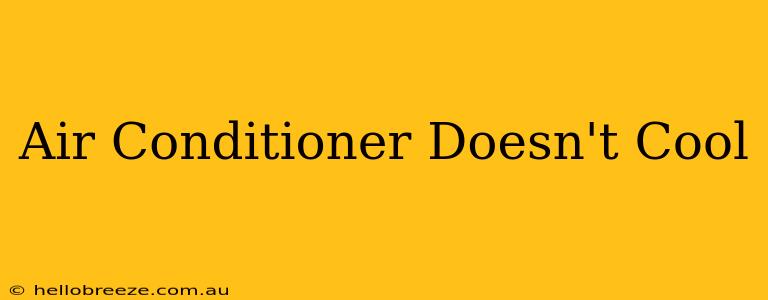Is your air conditioner refusing to cool your home, leaving you sweltering in the heat? Don't panic! While a malfunctioning AC can be frustrating, many issues are relatively simple to diagnose and fix. This comprehensive guide will walk you through troubleshooting common reasons why your AC isn't cooling properly, helping you stay cool and comfortable.
Common Reasons Why Your AC Isn't Cooling
Several factors can contribute to an air conditioner's inability to cool effectively. Let's explore the most frequent culprits:
1. Dirty Air Filter
This is the most common and easiest problem to solve. A clogged air filter restricts airflow, reducing the AC's cooling capacity. Dirty filters also force your unit to work harder, potentially leading to premature wear and tear.
- Solution: Check your air filter. If it's dirty or dusty, replace it with a new one. Consult your AC's manual for filter replacement instructions. Consider using a high-efficiency particulate air (HEPA) filter for optimal air quality.
2. Frozen Evaporator Coil
A frozen evaporator coil is a serious problem that requires immediate attention. This usually happens due to restricted airflow (often caused by a dirty filter, as mentioned above), low refrigerant levels, or a malfunctioning blower motor.
- Solution: Do not attempt to defrost the coil yourself. This could damage your unit further. Turn off your AC and contact a qualified HVAC technician for professional service.
3. Refrigerant Leaks
Refrigerant is crucial for your AC's cooling process. A leak significantly reduces its cooling ability. Refrigerant leaks require professional attention as they necessitate specialized tools and techniques for detection and repair.
- Solution: Call a qualified HVAC technician to diagnose and repair the leak. Never attempt to recharge refrigerant yourself, as this can be dangerous and ineffective without proper equipment and training.
4. Electrical Issues
Problems with the electrical system, such as a tripped breaker, faulty wiring, or a malfunctioning capacitor, can prevent your AC from working correctly.
- Solution: Check your circuit breaker box to ensure the breaker controlling your AC hasn't tripped. If it has, reset it. For more complex electrical issues, call a qualified electrician. Do not attempt to repair electrical problems yourself unless you possess the necessary expertise.
5. Blower Motor Problems
The blower motor circulates cool air throughout your home. A malfunctioning blower motor can result in poor or no cooling.
- Solution: This requires professional diagnosis. A technician can determine if the motor needs repair or replacement.
6. Condenser Coil Issues
The condenser coil releases heat outside. If it's dirty or clogged, the AC unit struggles to dissipate heat effectively, impacting its cooling performance.
- Solution: Clean the condenser coils with a coil cleaning brush or water hose. Ensure the unit is turned off before cleaning. For heavily soiled coils, professional cleaning might be necessary.
Preventing Future AC Problems
Regular maintenance is key to preventing AC issues and ensuring optimal performance. Consider these preventative measures:
- Regular filter changes: Change your air filter every 1-3 months, depending on usage and filter type.
- Annual professional maintenance: Schedule a yearly checkup by a qualified HVAC technician. This includes cleaning coils, checking refrigerant levels, and inspecting other vital components.
- Keep outdoor units clear: Ensure the area around your outdoor unit is free from debris and obstructions to allow for proper airflow.
By addressing these potential problems and implementing preventative maintenance, you can keep your air conditioner running efficiently and enjoy a cool and comfortable home all summer long. Remember, for more complex issues, always consult a qualified HVAC professional. Don't hesitate to seek professional help when needed; the cost of repair is often less than the discomfort of a non-functional AC unit.

